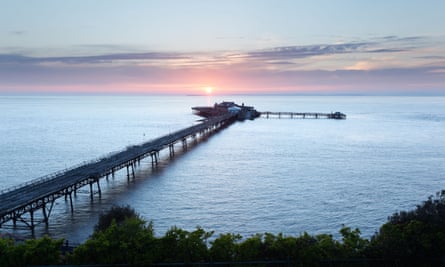The British seaside may be derided by some for being as tacky as the candyfloss stuck to the side of your mouth. Yet tackiness is fundamental to its charm, according to campaigners who say that seaside heritage sites should be protected as fiercely as castles and stately homes.
The Seaside Heritage Network (SHN) says amusement parks, lidos and scenic railways are all part of the UK’s role in the creation of modern tourism and should be cherished.
The network is running a public vote for its first annual Bucket and Spade List – a top 10 of the UK’s best seaside places and experiences – which includes staples such as Blackpool Tower and Bournemouth’s beach huts, as well as the Victorian-era Kursaal in Southend, one of the world’s first amusement parks, and the Morecambe Winter Gardens, which has been revived through the work of local volunteers.
“There are all sorts of preconceptions about the seaside,” said Dr Kathryn Ferry, a founder of the SHN. “We want to draw attention to some of the real quality of the historical structures, as well as the intangible heritage of something that’s really British and crucial to our sense of identity.
“OK, so people have been getting on aeroplanes and going abroad, but domestic tourism used to be the tourism. It was an industry, it was economically important to our country and it’s not often recognised. We’re still seeing much-loved landmarks fall into disrepair due to lack of investment.”
Southend’s Kursaal was built in 1898 and included a music hall, funfair, 90 shops and a menagerie, then was transformed into Luna Park in 1910 with joy rides including a rollercoaster. It was still a destination for Londoners into the 1960s, but declined as the package holiday grew. The last attraction was a bowling alley which closed in 2020 and the only remaining tenant of the Grade II listed building is a Tesco Express.

“It’s a really important part of Southend’s heritage,” said Matt Dent, a local Labour councillor and part of Concrete Culture, a group set up by musician Sam Duckworth of Get Cape. Wear Cape. Fly. “There’s a lot of people locally who have memories centred around it and a lot of people from east London who do too. It’s a huge waste that it’s not open to the public – there’s a lot of Victorian architecture that’s gorgeous.”
Although Southend-on-Sea city council owns the freehold, the 200-year-leasehold is owned by a global property investment group which has so far shown no sign of intending to invest, Dent said.
There are plenty of other seaside structures with uncertain futures. The Regent, a 1928 art deco cinema in Deal, has been closed since 2009. There is now a proposal to build townhouses on the plot, and a local campaign against the plans. The New Palace and Adventureland in New Brighton, Merseyside, was reportedly facing closure two years ago, although the owner appears to have had a change of heart after the growth in staycations following the pandemic.
The Weston-super-Mare Odeon cinema closed permanently in June, and Ferry hopes that it might receive support like the resort’s Birnbeck Pier, which closed in 1994 but was bought by the local authority in July and will receive substantial investment.
“You could go to a mill or a coal mine and think about our industrial heritage, and we’ve come to a place where we can celebrate that, and it’s taken a few decades’ worth of work to get to that point,” Ferry said. Cornwall and west Devon’s tin mines and mills became a world heritage site in 2006. “There are things on the Bucket and Spade List like the Morecambe Winter Gardens because people have been raising money to restore the building, and they’re doing brilliant work.” The theatre and concert hall, built in 1897, is receiving nearly £2.8m from the government’s Cultural Investment Fund to restore it as a 1,600-seat music venue.
after newsletter promotion

It will be close to the site of Eden Project Morecambe, an attraction similar to Cornwall’s indoor rainforest, and “those two things will mutually enhance the status of a resort that has had some major problems over the last few decades,” Ferry said.
Seaside buildings often receive less protection from English Heritage and Historic England because they have been altered due to the corrosive effects of salty sea air, according to Dr Allan Brodie, a visiting fellow at Bournemouth University who worked for both agencies and is a member of the SHN.
“There’s a plethora of plastic windows instead of original wooden sashes,” he said. “Therefore things don’t end up being listed.” Traditional shops may be well maintained, but the flats above them can be neglected, and in resorts with high levels of deprivation, it can be harder to meet heritage thresholds. “There are huge structural problems with seaside resorts and we argue they should be a special case for funding.
“I’ll take issue issue with anybody who slams the English seaside for being bad because it’s tacky. That’s one of the great things about it – it is tacky. We want to go there for a bit of tacky, and then go to a hotel. It’s got a decent ensuite, and a couple of decent restaurants around.”
Dr Anya Chapman, a member of the National Pier Society, said the trend was for more domestic holidays. “Inevitably we’re going to see a resurgence of more environmentally friendly forms of tourism – we certainly won’t be going to southern Spain or Greece in 20 years’ time in the summer.
“So we need to cherish the experiences we’ve already got, which are unique, because British seaside holidays were the first form of mass tourism in the world. We’ve really got something that we can be proud of.”
Join the exciting world of cryptocurrency trading with ByBit! As a new trader, you can benefit from a $10 bonus and up to $1,000 in rewards when you register using our referral link. With ByBit’s user-friendly platform and advanced trading tools, you can take advantage of cryptocurrency volatility and potentially make significant profits. Don’t miss this opportunity – sign up now and start trading!







Recent Comments